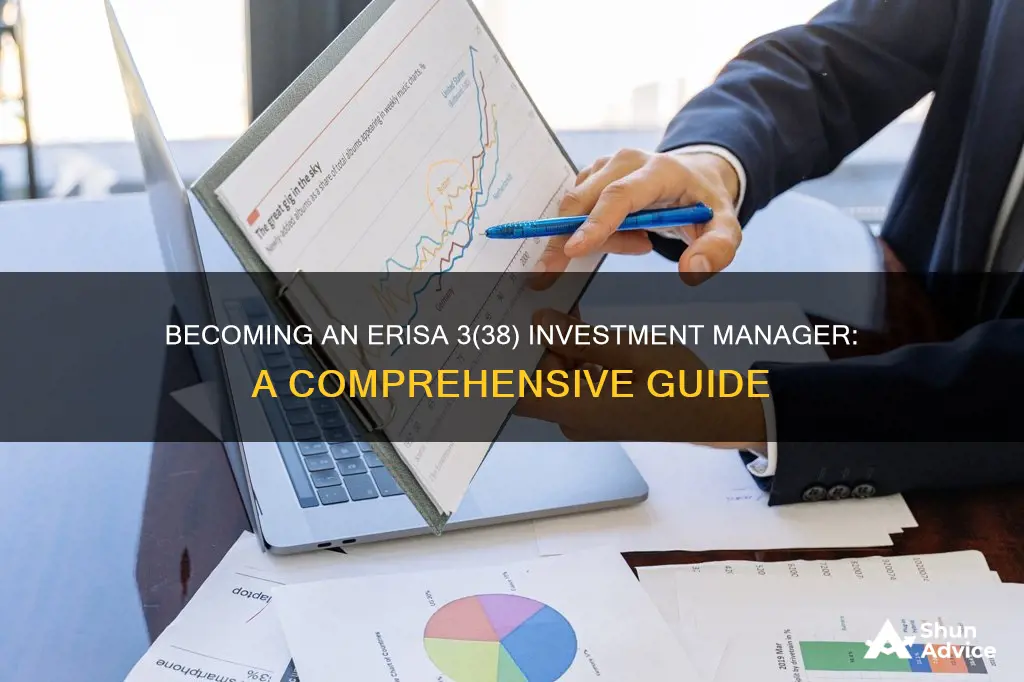
Becoming an ERISA 3(38) investment manager is a highly specialised role that requires a detailed understanding of retirement plan rules and fiduciary obligations. ERISA 3(38) investment managers are responsible for selecting, managing, monitoring, and benchmarking the investment offerings of a retirement plan. They assume sole fiduciary liability for investment selection and monitoring, which means they are responsible for making prudent and compliant investment decisions on behalf of their clients. To become an ERISA 3(38) investment manager, individuals must possess extensive knowledge of ERISA regulations, investment management, and fiduciary duties. They must also be able to create and manage an Investment Policy Statement, form an Investment Committee, and regularly report on investment performance. Additionally, ERISA 3(38) investment managers need to have strong analytical skills to evaluate investment options and make informed decisions. This role carries significant responsibility and risk, as poor investment decisions or non-compliance with ERISA regulations can result in lawsuits and financial liability.
| Characteristics | Values |
|---|---|
| Definition | A codified investment fiduciary on a retirement plan as defined by ERISA section 3(38) |
| Role | Selecting, managing, monitoring, and benchmarking the investment offerings of the plan |
| Outsourcing | Must be outsourced to an RIA firm, bank, or insurance company |
| Fiduciary Responsibility | The employer would act as an Investment Manager by default unless another party is explicitly named |
| Investment Committee | Many employers have created investment committees to satisfy 3(38) requirements |
| Discretionary Authority | Has discretionary authority to direct the investment of funds in some plans but not in participant-directed plans |
| Risks | There is a certain amount of risk associated with this role, especially as plans increase in size |
| Outsourcing Benefits | Outsourcing can reduce an employer's work, cost, and liability on a 401(k) plan |
| Qualifications | Requires a specialized understanding of retirement plan rules to meet fiduciary obligations under ERISA |
| Services | Plan-level and participant-level services include Investment Policy Statement (IPS) preparation, ERISA 404(c) assistance, model portfolios, and investment education |
| Control | The employer, or plan sponsor, relinquishes discretion and influence in roster decisions |
| Monitoring | The plan sponsor monitors the work of the advisor to ensure they are performing their duties in line with the advisory agreement and investment policy of the 401(k) plan |
| Suit and Liability Protection | The plan sponsor is protected from suits and liability for investment roster decisions |
What You'll Learn

Understanding the role of an ERISA 3(38) investment manager
An ERISA 3(38) investment manager is a codified investment fiduciary on a retirement plan as defined by ERISA (the Employee Retirement Income Security Act of 1974) section 3(38). The 3(38) investment manager is responsible for selecting, managing, monitoring, and benchmarking the investment offerings of the plan.
When hiring a 3(38) investment manager, you give them discretionary control over your plan investments. This means they assume full responsibility for the selection and monitoring of your investment lineup, deciding the mix of funds to offer and when fund changes are needed based on your objectives and their analysis. Given this role, 3(38) investment managers—not the plan fiduciaries—are generally held accountable for claims involving plan investments. However, it's important to note that while your fiduciary risk is reduced in this scenario, it isn't eliminated. You're still responsible for selecting and monitoring the 3(38) investment manager.
The 3(38) investment manager is a special type of fiduciary with full discretionary authority and control to make actual investment decisions. They may select, monitor, remove, and replace the investment options offered under the plan. The 3(38) investment manager must be a registered investment advisor, bank, or insurance company and must acknowledge their fiduciary status in writing.
The role of the 3(38) investment manager is to relieve the plan sponsor/trustee of fiduciary responsibility for investment decisions. The plan sponsor/trustee typically retains ultimate decision-making authority for investments and may accept or reject the recommendations of a 3(21) investment fiduciary. By appointing a 3(38) investment manager, the plan sponsor/trustee is relieved of all fiduciary responsibility for the investment decisions made by the investment professional. The plan sponsor is still responsible for monitoring whether the investment manager is performing their services but need not second-guess their investment decisions.
This shifting of fiduciary responsibility is a key distinction and a core advantage of using a 3(38) investment manager. With ever-increasing litigation and heightened regulatory scrutiny, many plan sponsors want this extra layer of protection, especially if they are uncomfortable making the plan's investment decisions themselves.
Ally Invest: Portfolio Margin Trading Options Explored
You may want to see also

Fiduciary duties and liabilities
A 3(38) Investment Manager is a codified investment fiduciary on a retirement plan as defined by ERISA section 3(38). The 3(38) investment manager is responsible for selecting, managing, monitoring, and benchmarking the investment offerings of the plan. In some plans, but not in participant-directed plans, a 3(38) also has discretionary authority to direct the investment of funds.
The duties of a 3(38) are set by ERISA and further enhanced by precedent from the Department of Labor. They can also vary insofar as they are defined by the plan document and related agreements. Generally speaking, those responsibilities for participant-directed plans include the following:
- Create and manage an Investment Policy Statement
- Form an Investment Committee
- Hold investment committee meetings
- Prudently select plan investment options
- Report on investments regularly
- Benchmark investments
- Replace funds and update models as needed
The 3(38) Investment Manager role is one of the three primary fiduciary roles. Outsourcing fiduciary roles can reduce the cost, risk, and work associated with sponsoring an employee retirement plan.
The intention behind ERISA was to ensure that those who manage retirement plans or their assets do so solely in the interest of plan participants and make good choices about investing plan assets.
A 3(38) Fiduciary may be a better choice if you want to maximize fiduciary liability protection for selection and monitoring plan investments, and/or have no internal plan fiduciary with the requisite expertise and credentialing to assume investment decisions and liabilities. Note that even a 3(38) cannot completely remove plan fiduciaries from all investment liability, as they retain the responsibility of monitoring the 3(38) advisor with regard to their suitability for the plan.
A 3(21) Fiduciary may be a better choice if you have the time, interest, and investment expertise needed to monitor investment performance regularly, evaluate the 3(21)'s recommendations, and evidence that your investment decisions are in the best interest of your plan participants while assuming the liability for determining the reasonableness of investment costs and performance.
A 3(38) investment manager must be a registered investment adviser (RIA) under federal or state law, a bank, or an insurance company.
Creating a Diversified Investment Portfolio: Strategies for Success
You may want to see also

Outsourcing the role
Secondly, outsourcing can help mitigate risks. Recent lawsuits have demonstrated that a large portion of the responsibility for the costs and performance of a 401(k) plan falls on the 3(38) investment manager. By outsourcing this role, employers can reduce their liability. The 3(38) investment manager assumes sole fiduciary liability for investment selection and monitoring, providing greater protection to the employer.
Thirdly, outsourcing allows employers to access specialised knowledge and expertise. Investment managers have a comprehensive understanding of retirement plan rules and are held to the "`prudent expert` standard". They are responsible for selecting, managing, monitoring, and benchmarking investment offerings. Outsourcing ensures that employers comply with ERISA regulations and make informed investment decisions.
When outsourcing the role of a 3(38) investment manager, it is important to select a qualified and reputable firm, such as an RIA firm, bank, or insurance company. The employer should also remain involved by monitoring the work of the investment manager to ensure they are performing their duties effectively and in line with the advisory agreement and investment policy of the 401(k) plan.
Building a Personal Investment Portfolio: Strategies for Success
You may want to see also

Qualifications and selection
When selecting an ERISA 3(38) Investment Manager, qualifications and expertise in retirement plan rules and fiduciary obligations are crucial. The manager's ERISA qualifications and understanding of fiduciary duties take precedence over investment experience or past performance. The primary role of the 3(38) Investment Manager is to make investment decisions and navigate fiduciary responsibilities, so a strong understanding of ERISA regulations and retirement plan rules is essential.
When considering candidates, plan sponsors should assess the manager's working knowledge of ERISA and other retirement plan regulations. It is also important to ensure that the 3(38) Investment Manager is willing to put their fiduciary status in writing. This provides clarity and assurance regarding their responsibilities and liabilities.
Additionally, plan sponsors should evaluate the investment philosophy and process of the candidates. This includes understanding the quantitative and qualitative investment criteria they consider when making decisions. It is also beneficial to inquire about their investment policies, investment philosophy, and management procedures.
Another important aspect to consider is the level of control and involvement desired by the retirement plan committee. If the committee wishes to retain some decision-making authority, engaging a 3(21) Investment Advisor, who has non-discretionary authority, may be more suitable. On the other hand, if complete discretion and control over the plan's assets are desired, a 3(38) Investment Manager is the appropriate choice.
Finally, plan sponsors should conduct due diligence by consulting their financial professional and evaluating potential candidates through requests for proposals or information. This process helps assess the candidates' qualifications, fees, and alignment with the plan's goals and objectives.
Retirement Planning: 401(k)s, Investing, or Saving?
You may want to see also

Common services provided
In addition to selecting and monitoring investments, many 3(38) investment managers offer a range of services that can help simplify your investment oversight. These services include:
- Creating and reviewing an investment policy statement
- Analyzing the existing lineup, asset classes, and diversification
- Reviewing the reasonableness of investment fees and expenses
- Providing detailed investment performance reports
Outsourcing these services can give your retirement plan committee, benefits team, and financial professional more time to focus on other plan initiatives. It's important to note that fees and services vary, so shopping around to find the right 3(38) investment manager for your plan is essential.
When considering a 3(38) investment manager, it is crucial to conduct due diligence. Start by consulting your plan's financial professional, who can help identify potential candidates and assess their services. It is also important to ask key questions, such as their investment philosophy, process, and knowledge of ERISA and other regulations. Understanding their fees, reports provided, and level of partnership will help you make an informed decision.
Building a Minimum Variance Portfolio: Strategies for Investors
You may want to see also
Frequently asked questions
An ERISA 3(38) Investment Manager is a codified investment fiduciary on a retirement plan. They are responsible for selecting, managing, monitoring, and benchmarking the investment offerings of the plan.
Hiring an ERISA 3(38) Investment Manager can help limit 401(k) investment liability. They assume sole fiduciary liability for investment selection and monitoring, reducing the risk for the employer. Outsourcing to an ERISA 3(38) Investment Manager can also save time, energy, and internal costs for the company.
The duties of an ERISA 3(38) Investment Manager include creating and managing an Investment Policy Statement, forming an Investment Committee, holding investment committee meetings, selecting plan investment options, reporting on investments regularly, benchmarking investments, and replacing funds and updating models as needed.
An ERISA 3(38) Investment Manager must be a bank, an insurance company, or a registered investment adviser (RIA) subject to the Investment Advisers Act of 1940. They must also acknowledge in writing that they are a fiduciary and assume legal responsibility and liability for their decisions.







